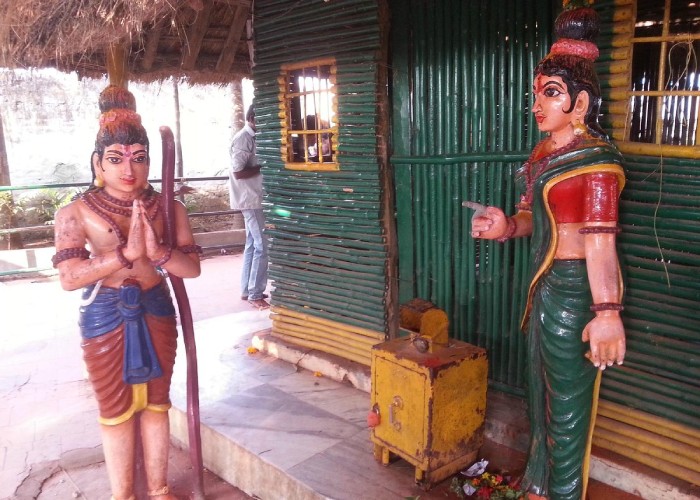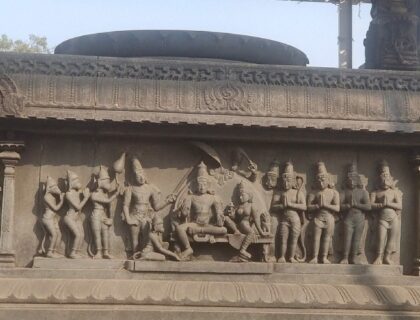Sita Ramachandraswamy Temple Bhadrachalam
Sita Ramachandraswamy Temple is a Hindu temple dedicated to Lord Rama And Goddess Sita located on the banks of the Godavari River in Bhadrachalam, Telangana, India. The temple is named after Ramachandraswamy also known As Lord Ram, an incarnation of Lord Vishnu. The temple, also known as Bhadrachalam, Bhadragiri, or Bhadradri, is one of Godavari’s Divya Kshetrams and is revered as Dakshina Ayodhya. The temple is located around 300 km away from the state capital, Hyderabad.
The Sita Ramachandraswamy Temple was built in the 17th century by the local Tahsildar, Kancharla Gopanna, also known as Bhakta Ramadas, a devoted follower of Lod Sree Ram. The hill is named after Bhadra, Meru’s son, who performed penance to see Sri Rama. Bhadrachalam derives its name from the Bhadragiri Hills and is regarded as Nature’s Beauty. It dates back to the 17th century and is said to have been built by the then Thasildhar and later a Saint, Gopanna of this region.
Legend of Sita Ramachandraswamy Temple Bhadrachalam
According to legend, during the Treta Yuga, Rama (avatar of the god Vishnu), his consort Sita, and brother Lakshmana spent fourteen years in exile in the Dandaka forest. Because of Rama’s grace, a stone transformed into a human named Bhadra, who was considered Mount Meru’s son. Bhadra, a devotee of Rama, later met the sage Narada, who initiated upadesam (instruction) of the Rama Taraka mantra.

For several years, Bhadra mediated and chanted the mantra along the Godavari River’s banks. Rama was pleased and promised to return to meet Bhadra once he had found Sita, who had been kidnapped by the demon king Ravana. However, Rama failed to keep his promise during his lifetime and didn’t come back as per his promise.

Later, Vishnu was pleased with Bhadra’s devotion. To fulfil the promise made by his Rama avatar, he appeared before Bhadra as Rama. Vishnu was in a hurry and forgot Rama was a mortal with two arms, instead appearing with four celestial arms. Rama’s upper arms held a conch, the Sudarshana Chakra, and a bow and arrow in his lower hands.
Sita was seated on his left thigh, while Lakshmana stood to the left. All three looked west towards the Godavari River. Unlike Vishnu, Rama held the conch in his right upper hand, intending to save Bhadra. The legend underlying this Bhadra narrative serves as the foundation for Bhadrachalam and other Bhadra-prefixed sites and temples across India.
History of Sita Ramachandraswamy Temple Bhadrachalam
Gopana was appointed as Bhadrachalam’s tehsildar (revenue officer). During the reign of Abul Hasan Qutb Shah, the last Sultan of Golconda (1672-1686), Gopanna enforced the Jaziya religious tax, which was intended to force Hindus to convert to Islam. Gopanna faced harsh criticism from local Hindus for enforcing the tax. Dejected by numerous rejections, Gopanna decided to use a portion of the tax for the temple and risk the consequences.

According to one version, Gopana built the temple with taxes he collected. In another version, Gopanna repaired the temple for Rama with those taxes after noticing its dilapidated state and attempted to offset the spent taxes by collecting donations. The temple was completed in the second half of the 17th century and cost nearly six lakh varahas.

When the Shah discovered the truth, he became enraged and summoned Gopanna to court. Gopanna explained that he never intended to misuse treasury funds and planned to reimburse them with future donations. The Shah ordered his soldiers to hang Gopanna if the money was not paid back within twelve years and imprisoned him.
According to one version of events, on the last day of the twelfth year, Rama and Lakshmana appeared in Shah’s dream and repaid the entire sum in Rama madas (gold coins bearing Rama’s inscriptions). When the Shah woke up, he saw real gold coins and released Gopanna.

During the Telangana movement, both Telangana and Andhra Pradesh claimed that the Bhadrachalam temple belonged to them. Telangana politicians and activists stood firm, stating that Bhadrachalam would not be separated from the state. Bhadrachalam was retained in Telangana, and following district reorganisation in October 2016, the temple became part of the Bhadradri Kothagudem district.
The architecture of Sita Ramachandraswamy Temple Bhadrachalam
The temple has three sections. The head of Bhadra is located in the first section of the temple, where there is a dedicated shrine. Lord Rama’s footsteps can be seen in the temple. The temple sanctum is revered as Bhadra’s heart. The third part, known as the main temple tower or Rajagopuram, houses the Lord’s feet. To reach the main entrance, one must climb almost 50 steps.

The Sita Ramachandraswamy Temple houses a panchaloha (five metals) Garuda statue that is highly revered by devotees. The Sudarshana Chakra is located on top of the Vimana. It is believed that the statue of Lord Rama and Goddess Sita is self-manifested here. It has several similarities with the Srirangam temple of Trichy. The central icon in the sanctum is called Swayambhu (self-manifested). Rama is seated in Padmasana, with Sita on his lap. Rama’s four hands carry the conch, disc, bow, and arrow. Lakshmana stands to his left.

Several shrines honour Goddess Lakshmi and Lord Anjaneya. The wall has several carvings, as well as inscription tablets. All of the water used for poojas is drawn from the temple tank.

On a higher hill, Gopanna installed and consecrated the icon of Ranganatha, a reclining form of Vishnu facing the south. Ranganayakula Gutta (Ranganatha Hillock) is a popular name for the location. A temple dedicated to Ranganatha’s consort, Lakshmi Thayar, stands opposite the sanctum.
Gopanna included these two temples to continue the tradition of Srirangam Ranganathaswamy Temple. The temple also houses several other shrines. The temple houses two shrines dedicated to Hanuman: the Abhayanjaneya temple on the riverbank and the Dasanjaneya temple in Bhadrachalam’s Thiruveedhi (divine passage).
Facts about Sita Ramachandraswamy Temple Bhadrachalam
- Sita Ramachandraswamy Temple, the country’s most famous temple dedicated to Lord Rama, is located on the left bank of the Godavari River in Bhadrachalam of Telangana.
- Bhadrachalam is also known as Dakshina Ayodhya (“Southern Ayodhya”), with Ayodhya serving as Rama’s capital city.
- It is a Hindu pilgrimage site, regarded as one of the most important holy shrines in South India, with a rich and unique historical background.
- The Sita Ramachandraswamy Temple was built in the 17th century by the local Tahsildar, Kancharla Gopanna, also known as Bhakta Ramadas, a devoted follower of Lod Sree Ram.
- The holy site is thought to have been visited by Sri Rama, Sita, and Lakshmana during their stay at Dandakaranya.
- The temple has four entrances, with the main one requiring a climb of 50 steps. In 1974, a massive door known as the Vaikuntha Dwaram was built to ensure proper management of visiting devotees.
- A gold-plated dwajasthambam (flag post) stands directly opposite the sanctum. It is made of panchaloha (a five-metal alloy), with carved images of Garuda, Vishnu’s vehicle.
- An eight-faced Sudarshana Chakra with a thousand corners sits atop the sanctum’s vimana, having been engraved by Gopanna after discovering it in the waters of the Godavari.
- A miniature of the temple’s deity can be seen on the vimana, while the central icon in the sanctum is known as Swayambhu (self-manifested)
- According to puranic and historical accounts, Lord Rama appeared long after he had shed his mortal coils to save his devotee Bhadra Maharshi, to whom he promised ‘moksha’ after intensive prayer.
- The Brahma Purana emphasises the temple’s significance and states that Vaikuntha Rama is capable of imparting knowledge to those who worship him in Bhadrachalam.
- Bhadrachalam is one of the Divya Kshetrams (special temples) that line the banks of the Godavari River. As a result, the river’s Pushkaram and Maha Pushkaram are celebrated here, along with others, every twelve years and 144 years, respectively.
Famous Festivals In Sita Ramachandraswamy Temple Bhadrachalam
- Vaikuntha Ekadashi celebrations are based on Srirangam’s traditions. According to the Bhadradri Kshetra Mahatyam (Importance of Bhadradri) in the Brahma Purana, devotees who seek Vaikuntha Rama’s blessings on the annual festival day of Vaikuntha Ekadashi will be granted salvation.
- Ram Navmi – Rama Navami is a Hindu festival that celebrates the birth of Rama, one the most popularly revered deities in Hinduism, also known as the seventh avatar of Vishnu.
- Diwali – Diwali is the festival of lights with its variations also celebrated in other Indian religions. It symbolises the spiritual “victory of light over darkness, good over evil, and knowledge over ignorance”.
- Vasanthotsavam – Vasanthotsavam (Spring Festival) marks the start of preparations for the annual Brahmotsavam (Grand Celebration) festival.
- Brahmotsavam – The main temple festival is the twelve-day annual Brahmotsavam (Vasantha Paksha Prayukta Srirama Navami Brahmotsavam), which takes place between March and April. Rama Navami, Rama’s birthday, is the main event of Brahmotsavam. According to Pancharatra Agama rules, Rama’s marriage to Sita takes place on this day, at a time that corresponds to the presence of the stars Punarvasu and Abhijit. This festival is formally known as Sri Sitarama Thirukalyana Mahotsavam.
Best Time to Visit Sita Ramachandraswamy Temple Bhadrachalam
This place is very heavenly and spiritual, and you can visit it all year. However, the best time to visit this temple is during the monsoon and winter seasons. During the monsoon season, this location receives moderate to heavy rainfall, making it appear heavenly with its greenery and bringing freshness elsewhere.
How to Reach Sita Ramachandraswamy Temple Bhadrachalam
By Air: The nearest airport is Rajahmundry Airport in Andhra Pradesh. Sita Ramachandraswamy Temple Bhadrachalam is 121 kilometres from Rajahmundry Airport (RJA).
By Rail: The nearest railway station is Bhadrachalam Road In Telangana, which is approximately 32 kilometres from the Sita Ramachandraswamy temple.
By Road: Telangana Transport Corporation buses operate 24 hours a day and are easily accessible from all locations. Also, APSRTC buses serve all parts of town. The Sita Ramachandraswamy Temple is well-connected to other cities in India. The nearest bus stop is near the temple grounds of Sita Ramachandraswamy Temple. There are several other modes of transportation, including taxis, automobiles, and local buses.
Also Read – Deo Sun Temple Aurangabad
Location
Facilities
- Drinking Water
- Pooja Item Shops
- Prasad Shops
- Restaurants Nearby
- Resting Room






























